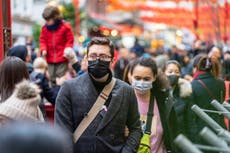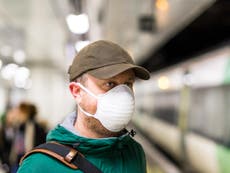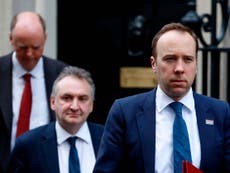NHS officials told me Muslim households are particularly vulnerable to coronavirus – it’s important to understand why
As the crisis develops, it’s likely that trauma will spread through communities whose shared culture is built around precisely the things the government has advised against

Britain’s Muslims are amongst the hardest hit by the Covid-19 pandemic – senior NHS officials that Muslims are particularly vulnerable to coronavirus.
To those inside Muslim communities like me, this is shocking but not surprising. This needs to be recognised more broadly before it is too late. If Muslims feel let down, excluded or forgotten by the government response, there will be repercussions that last longer than the outbreak.
Many Muslims live in extended families, often, like my household, with three generations under one roof. This means there are a higher number of carriers who can (and often will) infect an elderly relative. An older person cannot effectively self-isolate when they are living in close quarters with their children, grand-children and perhaps even extended family.
We are all social creatures, but maybe Muslims are more social than most. We eat together – often from one plate, sharing utensils and side dishes. For many Muslims, social intimacy like handshakes and hugs are so hardwired into their behaviour that the week-old invention of “social distancing” is both alien and absurd to them.
This is particularly the case in Britain’s 1600 Mosques (there are 130 just in my home town of Bradford). Islam is a collective religion, and although prominent British Muslim organisations like the Muslim Council of Britain have – in line with Muslim-majority countries like Saudi Arabia, Turkey and Egypt – instructed Muslims to pray at home, many of the UK’s mosques are likely to remain open. Thankfully most mosques have heeded the advice, but the prayer spaces that are still open may have even more people packed into them than usual, increasing the risk.
During Friday prayers (attendance at which is, under normal circumstances, an obligation for most Muslims), the close proximity of worshippers makes the spread of coronavirus a near certainty. We know this from events in the Muslim world: Malaysia’s spread of Covid-19 has been traced back to a single religious gathering at a Mosque, which allowed the virus to spread not only across that country, but to six others.
All this makes coronavirus particularly troubling in Muslim communities, some of which are, like Bradford, in the most deprived areas of the country, with poor health outcomes to match.
The niche ethnic supermarkets and halal butchers that many Muslims depend on for essential goods have less reliable supply chains than the big supermarkets, forcing many local Muslim grocers to significantly increase their prices. This is despite their customers being some of the poorest people in Britain.
And in pockets of Muslim communities, there is mistrust – or simple unawareness – of government advice. The official NHS website on the coronavirus, which has been prominently plugged during the prime minister’s daily press conferences, is available only in English.
This leaves many minorities whose English is not proficient enough to fully understand medical terms like “quarantine” and “pandemic” reliant on foreign or social media sources for their information.
Blogs, TikTok and YouTubers in Asia should not be a primary resource for Brits at a time of national crisis – their own government should be.
This is particularly the case for refugees, asylum seekers and recent arrivals including asylum seeker children in care, who are likely to have a lower than average level of English proficiency. They are also more likely to be already suffering trauma or mental health issues, which a near or total lock-down may take from bad to worse.
This trauma is going to spread through Muslim communities as the crisis develops. A ban on gatherings of more than 100 people is essentially a ban on Muslim funerals – I have never been to one with fewer than 300 attendees.
Many Muslims are anxious that without swift action, they will find their parents and grandparents dying in larger and larger numbers, and they won’t even be able to bury them properly. And this is during a time when the religious gatherings that would help them process and grieve will be stopped.
The government advice during these unprecedented circumstances has been clear and consistent. Now it must become multilingual and multicultural.
The coronavirus bailout is still behind the funding eventually made available during the financial crisis. Surely human lives are more important than bank balance sheets? Support should be made available for local authorities, charities and volunteers across the country to provide the food, supplies and companionship that the most vulnerable need.
Co-ordinated in my locality through an easily available app, the logistical effort behind this rollout is huge: We need everything from interpreters to therapists to expedited DBS checks. I have no doubt that Muslim communities will play their part, but they must be supported by their government.
Hygiene, health and responsibility to one’s neighbours is hardwired into Islamic culture. This includes the responsibility to not infect the neighbours with a fatal disease. But we can only use those values to keep all our fellow Brits safe if we self-mobilise, at the same time as we self-isolate.
Shadim Hussain is a member of the government’s steering group on adoption, and CEO of My Foster Family






Join our commenting forum
Join thought-provoking conversations, follow other Independent readers and see their replies